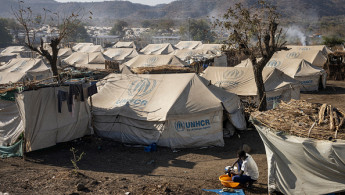Breadcrumb
Sudanese refugees flee UN camp in Ethiopia following attacks
At least 1,000 Sudanese refugees have fled a camp run by the United Nations in northern Ethiopia following a series of shootings and robberies, three of the refugees and the UN said.
The refugees said about 7,000 of the 8,000 residents of the Kumer camp left on foot early on Wednesday morning after they were attacked and robbed by local militiamen.
They said they were detained by the police shortly after leaving the camp, which is 70 km (43 miles) from the Sudanese border in Ethiopia's Amhara region. They asked not to be named for fear of reprisals.
The United Nations refugee agency UNHCR said it was aware that 1,000 people had left Kumer on Wednesday because they felt unsafe after a series of security incidents.
Spokespeople for the Ethiopian government, the Amhara regional administration, the federal police and the national refugee agency did not respond to requests for comment.
More than 1.6 million Sudanese people have fled their country since civil war broke out in April 2023 between the army and a rival paramilitary unit. About 33,000 have crossed into Ethiopia, according to UNHCR.
Sudanese refugees in Kumer told UNHCR in a recent letter that they have been facing rampant insecurity for months, including kidnappings for ransom, killings and armed robberies.
Amhara militiamen have been battling federal forces for nearly a year across the region in a conflict that left more than 200 people dead last year, according to the United Nations.
"We can no longer stay here," one of the refugees told Reuters by phone. "We have been abducted, killed, and attacked repeatedly since we arrived here in June. We have decided to go back to Sudan, despite the war."
UNHCR described the situation in the camp as "very difficult."
"The reasons they gave for leaving were primarily because they did not feel safe in the settlement," the agency said in a statement to Reuters.
"This follows several reports of security incidents, including crime, theft, armed robbery, shooting and alleged abductions."






![Anthony Blinken speech [Getty] Anthony Blinken speech [Getty]](/sites/default/files/styles/image_684x385/public/media/images/6263436E-8ACD-4D3C-9055-25A7BE79DD5A.jpg?h=d1cb525d&itok=fLHmHCRG)
 Follow the Middle East's top stories in English at The New Arab on Google News
Follow the Middle East's top stories in English at The New Arab on Google News
![Biden ceasefire deal [Getty]](/sites/default/files/styles/image_330x185/public/2187028205.jpeg?h=127ba027&itok=15KcZ7j9)

